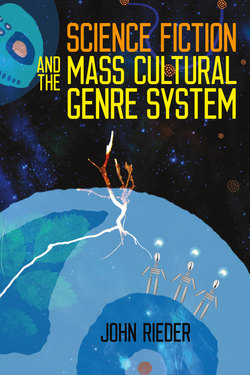Science Fiction and the Mass Cultural Genre System

Реклама. ООО «ЛитРес», ИНН: 7719571260.
Оглавление
John Rieder. Science Fiction and the Mass Cultural Genre System
Отрывок из книги
AND THE
JOHN RIEDER
.....
Before explaining the plan of the book, let me acknowledge some of its limitations, however briefly. It is a sketch of the history of SF, but only a sketch and a very selective one at that. I am under no illusion that the several dozen texts I write about in this book constitute some sort of representative sample of the entire genre. My narrative focuses on English-language SF and mostly American SF. I do not think or mean to imply that the influence of mass culture or the dynamics of cultural prestige attached to literary traditions and popular entertainments in America is a model or prototype for the rest of the world. The book is entirely devoted to the analysis of print and film SF to the exclusion of digital media or games, even though I am quite aware of how important they have become both commercially and culturally. Similarly, although there are two chapters about communities of practice, I have hardly brushed the surface of what could be said about SF fan cultures or contemporary participatory cultures. I can only hope that scholars who know more than I do about other national traditions of SF, digital media, fan cultures, and the rest of SF’s myriad array of venues and practices can make some use of my work in those areas of research.
The notion that SF’s history is one of “variation, expansion, conquest, capture, offshoots” rather than a lineage of ancestors and descendants is nowhere more important than in the study of what, following the hint in the title of Everett Bleiler’s indispensable bibliography, Science-Fiction: The Early Years, I would call early science fiction. Studying the beginnings of the genre is not at all a matter of finding its points of origin but rather of observing an accretion of repetitions, echoes, imitations, allusions, identifications, and distinctions that testifies to an emerging sense of a conventional web of resemblances. It is this gradual articulation of generic recognition, not the appearance of a formal type, that constitutes the history of early SF. Thus, rather than sorting out true SF from the genres in its proximity or trying to find its primal ancestors, it is far more useful to take stock of the way SF gradually comes into visibility in the milieu of late nineteenth-century fantasy, imperial adventure fiction, the romance revival of the 1880s and 1890s in England, the boy scientists of the American dime novel, utopian writing, the future war motif, and so on.9 One is not looking for the appearance of a positive entity but rather for a practice of drawing similarities and differences among texts, which is the point further elaborated by the third proposition.
.....